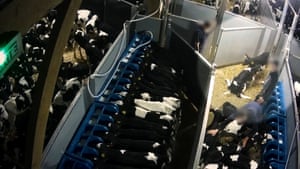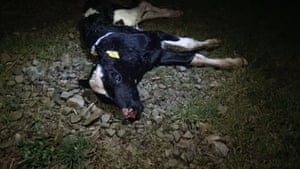Footage which appears to show Irish calves being beaten and kicked at a French feeding station has been published by animal campaign groups.
The video, published by Eyes on Animals (EoA) and French welfare organisation L214, appears to show workers repeatedly beating calves that are a few weeks old with sticks. One is kicked and another is dragged away, unable to stand. The calf was euthanised by a vet, said an EoA observer.
Ireland’s dairy sector, which earned the country EUR4.4bn (GBP3.9bn) in export revenues last year, relies heavily on veal farms in mainland Europe to buy unwanted male dairy calves. Dairy cows must produce calves in order to continue producing milk, but male calves are no use to the industry: they are known as “shipping-calves” in the Irish agricultural press.
The latest figures from Ireland’s national agricultural body, Teagasc, show there are just over 1.4 million dairy cows in Ireland this year, each of which will calve once, producing approximately 700,000 male calves. Figures from the agriculture ministry show almost 247,000 cattle were exported from the country in 2018.
Last month animal welfare campaigners followed calf trucks from the Irish port of Rosslare to the French port of Cherbourg. They documented a number of welfare and transport infractions.
EU law obliges calf transporters to feed and rest calves after nine hours of travel, “‘if necessary”. After a second nine-hour journey, or a total of 18 hours’ transport, calves must be fed and rested for 12 hours.
But Lesley Moffat of EoA said that from what her team had witnessed, “including the time it takes to move calves to and from ports, plus a boat journey of about 18 hours, the calves had been on the road for an estimated 23 hours without milk or milk replacer, well above the legal maximum of 18 hours.”
Campaigners described the handling of calves on arrival at Couville, France, as brutal. “The four Irish trucks would be carrying about 1,200 calves and when they arrive, they’re desperate for milk. The workers get impatient because they won’t leave the feeders. Calves were kicked and whacked repeatedly, particularly around the head with sticks. We saw one collapse, either because of the brutality or because of exhaustion and hunger. Or both.”
A year ago the two groups covered calf mistreatment at another Cherbourg feeding facility, Qualivia. Moffat said the incidents could not be dismissed as isolated.

The groups also argued that the Covid-19 pandemic has highlighted dairy industry weaknesses. “The continuing export of Irish dairy calves is a welfare nightmare. It breaks a range of EU laws and increases the risk of infections and diseases being transferred from one country to another. There is no automatic quarantine for truckers. On this trip the drivers moved from Rosslare to France through Belgium, up to Holland, and then they go home,” said Moffat.
In a statement, L214 described the transport of calves as “an ordeal” in normal times, and, during the Covid-19 pandemic, “totally irresponsible”. They called on the EU and the French agriculture ministry to “urgently stop” veal transports.
A lawyer for another welfare organisation, currently preparing a court case that could end unweaned calf exports from Scotland and possibly the rest of the EU, agreed about the welfare and disease risks.
“This is why we’re asking the Scottish courts to declare it unlawful to allow unweaned calves to be exported. If we win our case, it will hopefully have repercussions throughout the EU,” said Peter Stevenson of Compassion in World Farming.
Stevenson said he was shocked to see the Scottish and UK governments preparing to defend calf exports by appointing Queen’s Counsel barristers. He said the UK government and Boris Johnson, had “both said they want to end live exports”, making their defence “hypocritical”.
Contacted by the Guardian, the director of the feeding facility where the calf mistreatment was filmed, said the mistreatment allegedly shown in the video was “not possible” but refused to comment further. A person who answered the Qualivia mobile number refused to identify themselves and said they had no further comment on the video of calf mistreatment filmed last year.

Ireland’s Department of Food, Agriculture and the Marine emailed a statement saying it “continues to undertake inspection/control activities and provide certification to the farming and food sectors, whilst respecting HSE [the Irish health service] public health guidance with regard to hygienic and social distancing protocols.”
The statement also said that if “there is evidence of alleged non-compliances at a premises in France, anyone with such evidence should bring the matter immediately to the attention of the authorities there, who can investigate/respond as necessary”.
At the time of publication, the French agriculture ministry had not responded to requests for comment.